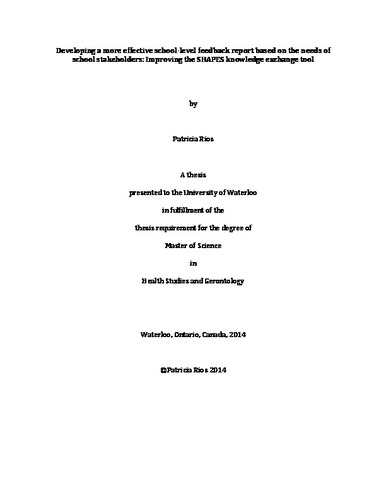| dc.contributor.author | Rios, Patricia | |
| dc.date.accessioned | 2014-02-20 20:49:13 (GMT) | |
| dc.date.available | 2014-02-20 20:49:13 (GMT) | |
| dc.date.issued | 2014-02-20 | |
| dc.date.submitted | 2014 | |
| dc.identifier.uri | http://hdl.handle.net/10012/8272 | |
| dc.description.abstract | Objective: The primary goal of this study is to understand what factors contribute to teachers and administrators involved in these projects viewing the YSS feedback reports as effective and useable in order to continue improving the design and content of the reports to encourage knowledge utilization and integration at the school level.
Methods: This study employed a mixed methods approach that included both qualitative and quantitative methods of data analysis. Specifically this study employed a concurrent nested design wherein quantitative data analysis was performed concurrently within a predominantly qualitative study. The qualitative portion consisted of telephone interviews with YSS participants that had viewed their School Profile. The quantitative portion was a secondary data analysis that examined the relationship between a downloading behaviour outcome and various school characteristics and contextual factors.
Results: Of the 57 eligible participants that were identified from the 2010-11 YSS sample, 8 participated in telephone interviews; in the quantitative analysis data from 448 of the schools that participated in the 2010-11 YSS were used. Overall interview respondents rated the School Profile as a valuable and utile KTA tool for them and their school communities. Aspects of the profile that contributed to its value were the tailored and quantitative information it provides; the clarity and readability of its design; the ease of accessing and sharing the profile in an electronic format; and the broad range of health topics covered in the Profile. Participants were also asked to discuss their use and sharing of the profile with almost all respondents indicating that they had shared the profile within their school and/or community. Instrumental and conceptual knowledge use were the most common forms described by participants. Participants also commonly expressed a desire for more resources to support the continued use and uptake of the Profile in their school and community. The quantitative analysis revealed a statistical relationship between location in certain provinces and downloading behaviour but no other predictor variables proved significant in the full logistic model.
Conclusion: The findings have contributed to understanding what facets of the School Profile contribute to its value as perceived by the individuals using it and point to a few avenues of further investigation regarding the Profile and its function within the YSS. The positive response by interview participants indicates that the Profile in its current state is a valuable and useful tool, however the use of additional strategies to support its uptake and utilization could be improved. The findings that location in certain provinces, some of which have collaborative projects with the YSS, may influence Profile downloading and health outcomes within schools is a potentially important avenue for further investigation and refinement of YSS KE systems. | en |
| dc.language.iso | en | en |
| dc.publisher | University of Waterloo | en |
| dc.subject | Knowledge Translation | en |
| dc.subject | Knowledge Exchange | en |
| dc.subject | Youth Health | en |
| dc.title | Developing a more effective school-level feedback report based on the needs of school stakeholders: Improving the SHAPES knowledge exchange tool | en |
| dc.type | Master Thesis | en |
| dc.pending | false | |
| dc.subject.program | Health Studies and Gerontology | en |
| uws-etd.degree.department | Health Studies and Gerontology | en |
| uws-etd.degree | Master of Applied Science | en |
| uws.typeOfResource | Text | en |
| uws.peerReviewStatus | Unreviewed | en |
| uws.scholarLevel | Graduate | en |

